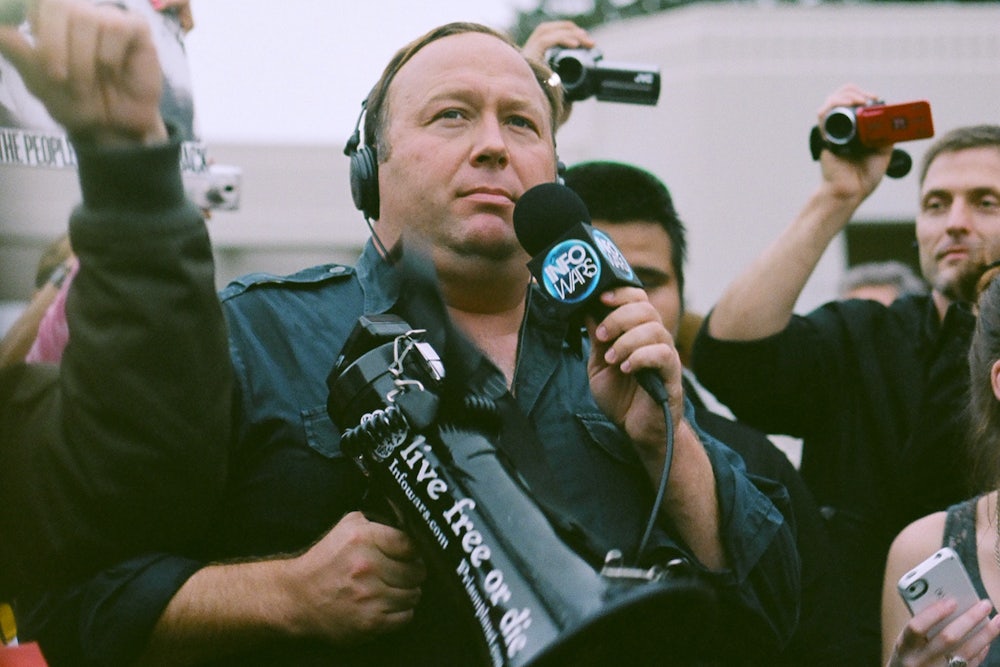What does it take to get banned from Facebook? In the case of Alex Jones, quite a bit. Jones, the proprietor of InfoWars, pushed the PizzaGate conspiracy that led to a gunman firing an AR-15 through the ceiling of a Washington, D.C., restaurant. He has claimed that “no one died” in the 2012 Sandy Hook massacre. He has claimed that the “Jewish mafia” controls a number of powerful entities, including the American health care system, and that several prominent Democrats are demons posing as human beings. A week ago he mimed shooting special counsel Robert Mueller, who he has called a “demon,” a “pedophile,” and the head of a Deep State conspiracy against President Trump.
Jones has amassed sizable audiences across multiple platforms, which he uses to push insane conspiracy theories and dubious dietary supplements. Jones’s YouTube page alone had 2.4 million subscribers as of this week. But in response to a rising drumbeat of calls for Jones and InfoWars to be banned, Apple Podcasts, Spotify, YouTube, and Facebook all pulled the plug on Jones on Monday. Apple led the way and Facebook followed soon after, with both outlets citing Jones’s “hate speech.” YouTube has largely stayed quiet about its decision to ban Jones, but has suggested that unspecified violations to its Community and Service Guidelines are responsible. Twitter is, as of this writing, the only social network where InfoWars still has a platform, while Facebook has indicated that Jones can appeal its decision.
Is Jones’s ban an indication that Silicon Valley is finally purging toxic sites like InfoWars? Or are tech companies doing the bare minimum to free themselves from what they see as primarily a public relations problem? The difficulty they had in banning Jones suggests the latter. Furthermore, it shows that, even if Silicon Valley truly wanted to get clean, there are limits to managing the speech of unimaginably large platforms composed of hundreds of millions of users.
The bans on Jones came in a flood, but they weren’t coordinated. It seems that Facebook and YouTube were waiting on some other company to ban Jones first. When Apple made its move, they followed in quick succession. Facebook had, until recently, defended Jones’s right to make statements that were destructive and demonstrably false. Asked by Kara Swisher last month about the conspiracy theories that outlets like InfoWars circulate on Facebook, CEO Mark Zuckerberg suggested that he was fine with Holocaust deniers using his platform because they might earnestly believe that Nazis did not systematically murder millions of Jews. (He later apologized.)
Free speech has become an increasingly thorny issue for Facebook, Twitter, and YouTube (which is owned by Google), particularly after the election of Donald Trump. With conservatives claiming that they have been unfairly targeted by tech companies, Zuckerberg and Twitter CEO Jack Dorsey have attempted to curb the backlash by presenting themselves as champions of free speech. Squeezed by angry conservatives spoiling for a culture war on one side and investors demanding constant user growth on the other, Facebook and Twitter have indicated that they are open to just about everyone—including frauds like Jones.
The decision to ban Jones, then, is an indication that concerns about hate speech, conspiracy theories, and fake news are being taken seriously—or at the very least, that these concerns can be serious PR headaches. Previously, the threat of a vocal and organized response from right-wingers—who are up in arms about Jones’s ban—would have spooked Facebook and YouTube. Twitter, the lone holdout, is now in a strange position. With all of its peers having kicked Jones out, keeping him on the platform (where he is verified) looks an awful lot like an endorsement.
To be fair to Twitter, Jones has hardly been silenced. The InfoWars app is still available from the Apple store and Android’s Google Play. Jones has high-profile defenders in right-wing media, like Matt Drudge, and may very well become a cause celebre for conservative politicians who are courting the far right, like Senator Ted Cruz, who has attempted to walk a line in which he protects the conspiracy theorist’s “free speech” without explicitly endorsing the crazy stuff he has said. Cruz even appropriated a famous poem about the Holocaust to defend Jones, saying, “You know how the poem goes, First they came for Alex Jones…”
But the pressure on Facebook, YouTube, and others to block Jones had reached a critical mass. These companies were faced with two options they did not care for: Either ban Jones and deal with a backlash from the right or keep him and deal with a backlash from those demanding that they not facilitate the spread of conspiracy theories that not only mock the deaths of massacred children, but also result in real-world violence. It’s now clear that Facebook will remove a dangerous hatemonger if a lot of people demand it.
It’s not clear, however, if it will swiftly remove a figure of Jones’s ilk without a larger public campaign. The problem with Jones is a problem with enormous social media platforms in general. WhatsApp, Instagram, and Facebook—all owned by Facebook—have a combined 2.5 billion users. Five billion videos are watched on YouTube every day. These companies have grown so large that they can’t effectively regulate speech.
Their incentives, moreover, point in the opposite direction. These companies try to cater to the interests of all of their users, which is how people like Jones thrive in the first place. And in his Holocaust comments, Zuckerberg did get at something true: Facebook doesn’t technically have a responsibility to suppress hateful speech. The InfoWars mess is symptomatic of an industry that has grown too large and unruly, with an outdated legal and regulatory framework that both under-regulates platforms and gives them little motive to self-regulate. Jones and InfoWars may be barred from Facebook. But the problems that they represent are here to stay.
